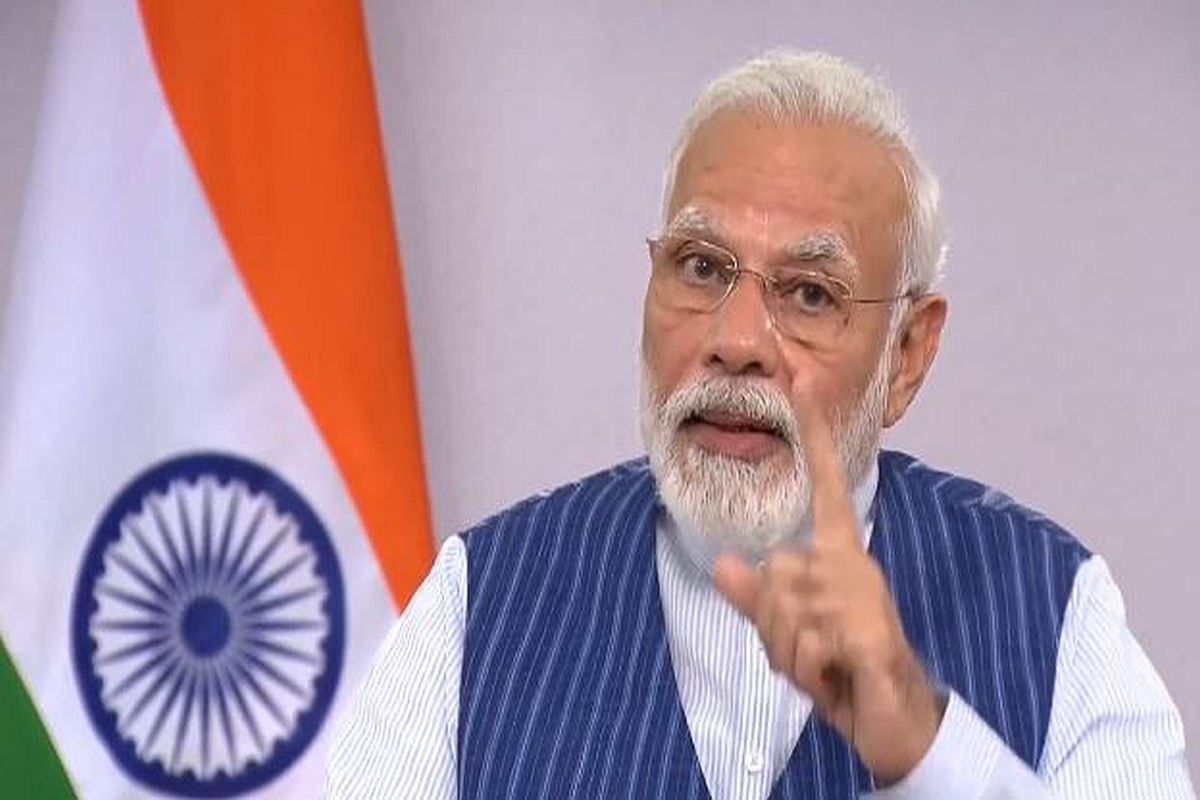US firms can use Gold Cards to recruit Indians: Trump
The "Gold Card" unveiled by President Trump on Wednesday offers US Citizenship to wealthy foreign nationals provided they are willing to invest USD 5 million.
In India too, Prime Minister Modi is under constant watch and his handling of the pandemic will be his legacy for years to come.

Prime Minister Narendra Modi (Photo: Twitter | @narendramodi)
When I went to Gujarat years after the massive 2002 earthquake which shattered the state, people talked of “before the earthquake” or “after the earthquake” while referring to the developmental works undertaken by the Modi government in the state and were full of praise for his relief and rehabilitation initiatives.
Now the time has come to talk of “before Coronavirus” and “after Coronavirus” not only in India but also in the entire world. The pandemic is testing leaderships the world over. In the US, President Donald Trump is facing the music; in the UK, Prime Minister Boris Johnson is under attack; Chinese President Xi Jinping is struggling with the system and Japanese Prime Minister Shinze Abe is just about managing the show.
Advertisement
In India too, Prime Minister Modi is under constant watch and his handling of the pandemic will be his legacy for years to come. Well-known columnist Thomas Friedman talks of the ‘unknown unknown’. Coronavirus certainly comes under this category.
Advertisement
He points out, “Before 2004, Facebook was just being launched; Twitter was only a sound; the cloud was still in the sky; 4G was a parking place; LinkedIn was a prison; for most people, applications were what you sent to colleges, Skype was a typo and Big Data was a rap star. And the iPhone was still Steve Jobs’ secret pet project. All these have really wired the world.”
Today these tools come in handy when you are in isolation due to the virus. The first test for Prime Minister Modi will be his handling of the post lockdown period. Last week’s migrant worker plight is an example of how the Centre and the state could have handled things better. As Modi admitted this is only the beginning and there is a long way to go. He needs the help of the bureaucracy, media, public and community leaders.
More than anybody else, the Prime Minister knows how difficult it is going to be to steer the country through the pandemic. Any gap in the chain for safeguarding people or providing food and shelter during the lockdown period will be remembered for long. It has actually hit the poor more than others. At another level, it is clear that nothing will be the same for the political leadership. The pandemic is likely to become a landmark in the future and a lot will depend on how they handle the crisis, which is the first real test for their leadership.
After all, at the state level chief ministers have to think of their own leadership and winning the elections whenever it is due. Bihar Assembly polls at the end of the year will be the first test followed by Tamil Nadu, West Bengal, Kerala and Jammu and Kashmir in 2021.
Chief ministers have already started demanding more money from the Centre for coronavirus relief in their states. It is good that the Centre has released Rs 11,000 crore from the State Disaster Relief Fund to help fight the health crisis. Therefore the mantra for the Centre and the state is to cut red tape, activate the bureaucracy and goad them to deliver. This is not going to be easy and success will depend upon the political will of the leadership. Accountability and responsibility at all levels is the need of the hour.
The leaders of various political parties are also facing the test. When Prime Minister Indira Gandhi imposed emergency, most opposition leaders were put in jail but today it is the fear of the coronavirus which restricts their movements. Though in isolation during the lockdown period, how they activate their workers is their first test. Congress president Sonia Gandhi has activated Congress chief ministers to provide relief.
At the party level she has set up a coordination committee and has activated the party machinery. For the Left parties, Kerala is a shining example. The regional satraps have a lot at stake, as they run one-man shows. The BJP is already ahead in relief work with the full support of the RSS. BJP President J.P. Nadda is also holding videoconferences with office bearers, state presidents and BJP chief ministers daily tracking relief work.
So they understand the problem. Sonia Gandhi has put the situation succinctly in her address to the Congress Working Committee on Thursday. “Covid-19 does not differentiate between political ideology, religion, caste, age or gender. The choices we make today will have a direct impact tomorrow on our family, neighbourhood, community, environment and nation. How effectively we meet this challenge, how we protect all sections of our society, specially the most vulnerable among us will define us for generations to come.” Indeed, what she said applies to all other parties and their leaders.
Advertisement